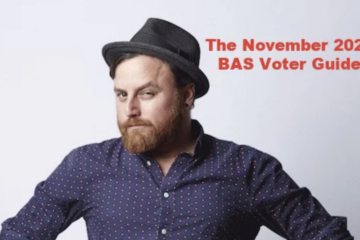The March 2020 BAS Voter Guide
Primarily researched and written by Stephen Torres with help from Stuart Schuffman.
Seeing as the 2020 California Primary is less than a month away we figured it was time to put out our voter guide to help you decide who and what to vote for on Tuesday, March 3rd, 2020. Vote by mail ballots should have already hit your mailboxes, so you can look at this guide while filling yours out, or print it to take to the booth on election day.
The March 2020 BAS Voter Guide
The Quick Guide (Longer Explanations Come After)
Federal
President: Bernie Sanders
United States House of Representatives
US Representative District 12: Shahid Buttar
US Representative District 14: Jackie Speier
State
California State Senate, District 11: Jackie Fielder
California State Assembly, District 17: No Endorsement
California State Assembly, District 19: Phil Ting
Judges
Superior Court Judge, Seat 1: Maria Elena Evangelista
Superior Court Judge, Seat 18: Michelle Tong
Superior Court Judge, Seat 21: Carolyn Gold
Democratic Central Committee (DCCC)
District 17 (Eastern Half of SF):
John Avalos
Hillary Ronen
David Campos
Christopher Christensen
Matt Haney
Frances Hsieh
Honey Mahogany
Shanell Williams
Jane Kim
Rafael Mandelman
Peter Galotta
Anabell Ibañez
Tyra Fennell
Gloria Berry
District 19 (Western Half of SF):
A.J. Thomas
Keith Baraka
Janice Li
Kelly Akemi Groth
Gordon Mar
Faauuga Molina
Mano Raju
Queena Chen
Li Miao Lovett
Leah LeCroix
State Propositions
Proposition 13 – $15B School Bond: YES
Local Propositions
Proposition A – City College Job Training, Repair, & Earthquake Safety Measure: YES
Proposition B – San Francisco Earthquake Safety & Emergency Response Bond: YES
Proposition C –Retiree Health Care Benefits for Former Employees of San Francisco Housing Authority: YES
Proposition D – Storefront Vacancy Tax: YES
Proposition E – Limits On Office Development: YES
Longer Explanations
Federal
President: Bernie Sanders
It’s no secret that we think that Bernie Sanders is the ideal candidate to be the next president of the United States. He has the best proposed policies and can take the US in the direction it needs to go in terms of social justice, the environment, health care, and more. We took a deep dive into explaining why right here.
That said, he’s also our best candidate for beating Donald Trump, here’s why:
To win the presidency all the Democrats really have to do is get a huge voter turnout in five swing states: Ohio, Pennsylvania, Florida, Michigan, and Wisconsin. We already know where most of the other states are going fall, at least the ones with enough voters to matter.
It’s common knowledge that people over 30 vote way more than people under 30. So, to get that huge voter turnout it’s imperative that we get Millennials (who now outnumber Baby Boomers), out to the polls.
Therefore, to win, we need to choose the candidate who fires up the most young people. Can you name a candidate who excites young people more than Bernie Sanders?
The biggest reason Trump won is because 100 million people weren’t excited to vote for Hillary Clinton, so they didn’t vote at all.
Let’s not make that mistake again.
United States House of Representatives
US Representative District 12: Shahid Buttar
Here’s the deal. Despite working hard to navigate the incredibly difficult task that was the impeachment, Congresswoman Pelosi’s track record in terms of nearly everything else hasn’t always meshed with what’s important to us close to home.
Buttar, however, does. Specifically on things like the Green New Deal, single-payer health care, and privacy In addition he’s a good lawyer who has been on the right side of the things from the beginning of his career –from LGBTQ rights, to the Iraq War, to surveillance.
More importantly, however, a reason to vote for Buttar, aside from breathing fresh air into the office, is to let November be a hash out between two Democrats (one progressive, one moderate) and not a mainstay Democrat and a Republican shill.
US Representative District 14: Jackie Speier
One of our stalwart progressive faves who gets things done both at home and in the District of Columbia. Speier is the best and has our vote as always.
State
California State Senate, District 11: Jackie Fielder
Change has to start somewhere and Senator Weiner has had his chance to prove that he has the best interest of his constituency at heart, and not special interests. And, well, that hasn’t really happened. Moreover the would-be/maybe hallmark of his career in Sacramento, his own personal Frankenstein, SB 50 has massive ramifications not just for San Franciscans, but all Californians.
Fielder, however, seems to view things from the same perspective that the rest of us do. Not from far away but at street level where we all live. Instead of advocating the same policies of demolish/evict and build anew, which benefits no one but real estate and developers, she approaches the housing crisis from the common sense approach of preserving and protecting our wholly underused housing stock and ensuring that new development is made attainable by current residents of San Francisco, not those looking for a new Pied-à-terre.
With a long history of being on the right side of things and having a multifold plan to approach our current crisis, what say ye to keeping the progressive momentum going and turn the machine on its head? We say yes.
California State Assembly, District 17: No Endorsement
California State Assembly, District 19: Phil Ting
Assemblymember Ting is usually on the progressive side of the spectrum and with his expungement bill last year, we feel he merits a nod this round.
Judges
Superior Court Judge, Seat 1: Maria Elena Evangelista
Evangelista is an SF native who we endorsed when she ran against a seated judge in the summer of 2018. We happily endorse her once again. A public defender who is decidedly anti-prison industrial complex, we find her a far more suitable candidate than the Republican-endorsed millionaire running against her.
Superior Court Judge, Seat 18: Michelle Tong
Another alumnus of the Public Defender’s Office, Tong is a believer in restorative justice and has a strong history defending immigrants, service industry workers, and domestic violence victims. The daughter of immigrants, she has an understanding of the fear and confusion surrounding legal issues for immigrants.
Her opponent is also another Republican endorsement who lives in Marin. Really? People come on.
Superior Court Judge, Seat 21: Carolyn Gold
Carolyn Gold pretty much changed the game in 1996 when she founded the Eviction Defense Collaborative. Yes, the very same EDC that you’ve run to when your landlord starts acting shady. She has saved thousands of people from losing their homes in The City and created change that we are finally seeing today. Most importantly in her years at trial, she has come to earn the esteem and reputation for fairness from housing advocates and landlord advocates alike.
And, her opponent is veteran of the D.A.’s office that doesn’t live here and apparently doesn’t take well to rejection. Or politics. But is going to do what she’s going to do. Hard to know really. I guess if she should get on the bench, and you’re in her courtroom, look excited? Or else…
Democratic Central Committee (DCCC)
What is this and who the hell are these people? Well, a mix of politicians, organizers, activists and the occasional crackpot. Check out more on the what and why from our very own Joe Kukura, here. Also rundowns of all the candidates on the ballot by Joe are here and here (article drops tomorrow).
District 17 (Eastern Half of SF):
John Avalos – A strong environmental and housing advocate who is running to take back his seat as District 11 supervisor this fall.
Hillary Ronen – A housing rights and anti-displacement force, and current District 9 supervisor.
David Campos – A former District 9 supervisor who strongly presides over the DCCC currently.
Christopher Christensen – A long time member of the ILWU who has helped organize the unionization of Anchor Brewing, VCA, and most recently Tartine.
Matt Haney – Housing, justice reform, and youth advocacy are a few of the this District 6 supervisor’s hallmarks.
Frances Hsieh – A major mover and shaker in politics for over 20 years and incumbent to the DCCC.
Honey Mahogany – Co-founder of the Compton’s Transgender Cultural District and incumbent to the DCCC.
Shanell Williams – City College Trustee who came to the job knowing what it meant to be a student at City.
Jane Kim – Kick-ass former District 6 supervisor who should’ve been our mayor, but is running Bernie’s campaign in California, so hey.
Rafael Mandelman – Rafael is the supervisor for District 8, and advocate for small businesses, and revising the bathhouse code.
Peter Galotta – Former Harvey Milk Club prez who is incumbent to the DCCC and known for his strong environmental advocacy.
Anabell Ibañez – Fights to protect SF schools from privatization while at the United Educators.
Tyra Fennell – The director of arts non-profit Imprint.City, which is working to build the Bayview Hunters Point neighborhood into the emerging arts district of San Francisco.
Gloria Berry – Gloria has been a loud voice in the movement to tell the world about the fraudulent toxic cleanup in the Hunter’s Point Shipyard.
District 19 (Western Half of SF):
A.J. Thomas – Attorney who has put in a lot of time in on the behalf of the city’s workers and tenants.
Keith Baraka – Incumbent to the DCCC and longtime queer rights/social justice vet who founded the SFFD’s Res Q.
Janice Li – BART Board Member, Bike Coalition, Harvey Milk Board alum who is probably as strong as the electric third rail.
Kelly Akemi Groth – Incumbent at the DCCC who is an immigrants and justice reform advocate.
Gordon Mar – District 4 supervisor with strong a background in housing and secured Free City.
Faauuga Molina – SF native and School Board member who’s made a career on student advocacy and mental health.
Mano Raju – Our current Public Defender and now a two time BAS endorsed candidate. Founding member of Defenders for Racial Justice.
Queena Chen – Another strong transportation and community advocate who works for accessibility in monolingual communities.
Li Miao Lovett – Chinatown native who supports keeping SFUSD accessible to children most at need and opposes SB 50 in its current state.
Leah LeCroix – Another DCCC incumbent who is dedicated to criminal justice reform and stemming the flow of black and brown residents out of San Francisco.
State Propositions
Proposition 13 – $15B School Bond: YES
Unfortunately numbered, it behooves us to clarify that this has nothing to do with 1978’s infamous Prop. 13 and we agree with the lovelies at the League of Pissed Off Voters that when a proposition number becomes as notorious as this one, it’s best to consider retiring it for clarity’ sake.
This measure allows sending funding for the construction and upgrading of all state funded schools in a way that is equitable and addresses needs by the most dire.
Local Propositions
Proposition A – City College Job Training, Repair, & Earthquake Safety Measure: YES
If you have ever set foot on most of City College’s facilities, most especially its largest, the main campus, you know how desperately its infrastructure needs major investment. This money cannot be pocketed or appropriated elsewhere, and absolutely all of it must be used for construction and renovation of CCSF facilities.
Proposition B – San Francisco Earthquake Safety & Emergency Response Bond: YES
San Francisco has a nasty habit of being unprepared for disaster and for building in places it shouldn’t. This bond primarily siphons money into the construction and renovation of the city’s Emergency Firefighter Water System (read: the giant water cisterns all over town that prevent us from burning to a crisp in the next massive conflagration) and fire stations. Some will argue that we have too many of these and the resources can be used elsewhere, but in catastrophic events like a major earthquake, a few blocks can seem like miles, and as of late there seem to be more blocks getting added to the city. The more outposts of aid you have, the less lives and housing are lost.
Proposition C –Retiree Health Care Benefits for Former Employees of San Francisco Housing Authority: YES
A weird housekeeping measure, it is simply to ensure that folks that work for the SFHA get the same benefits as every other city employee. The League has full break down on the drama that got us to this point, but basically the SFHA used to be its own deal and now it’s run by the city, so in order for employees to get the same benefits, the city charter needs to be amended, which only happens if we vote on it.
Proposition D – Storefront Vacancy Tax: YES
Finally a way to combat and hold commercial landlords accountable. And before we go too far, this is not an attack on property owners. In fact it isn’t even citywide, in that it applies specifically to forty specific neighborhood commercial districts. What it does is protect the interests of communities along these corridors by taxing landlords incrementally who are holding out expressly for the highest rent they can possibly get. Mostly longtime owners, they have little in property tax, and in a city like this with so many soft-bottomed buildings, they are usually collecting residential rent upstairs.
This proposition creates a renter’s market for small business, which a city like ours desperately needs. If they are looking at a tax levied on them per vacant linear foot, you can bet you’ll see those commercial rents start coming down to an attainable level for a local community business trying to start out or hold on. With major retail online and ghost kitchens proliferating our daily lives, they need all the help they can get.
Proposition E – Limits On Office Development: YES
Adding to the glut of office highrises in San Francisco is a trajectory to be avoided, but at least this proposition finally reigns in the rampant construction and swift take by simultaneously incentivizing developers to help staunch the housing crisis.
Every year the city has a cap on how much square footage of office space can go up and a goal of affordable housing developed. Not surprisingly the cap on office space gets met (and supplemented until recently from rollovers from the past) and we never meet our housing goals. With this prop, the city can now cut the allotted amount of office space developed by the same percentage that isn’t meant on our housing goal. If, however, developments include affordable housing, they get a head start on next year’s allotment. Curbing the unmitigated cash flow to commercial development while adding to the city’s affordable housing is something we can definitely live with.










